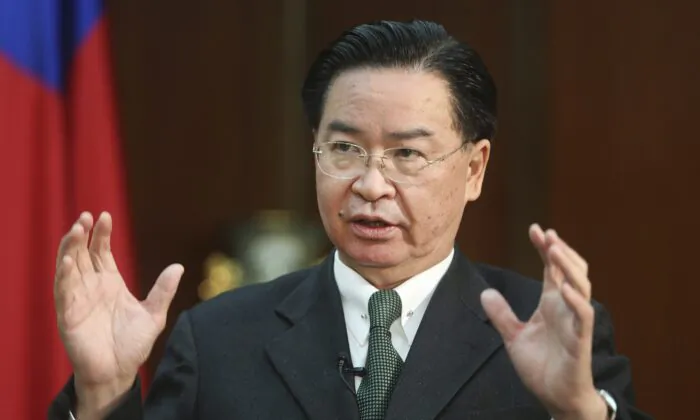
Taiwan’s foreign minister has urged New Zealand to increase its investment in Pacific countries to reduce their dependence on China, warning of the Chinese Communist Party’s (CCP) “ambition” in the region.
“I hope New Zealand can make more investment in the Pacific countries,” Taiwanese Foreign Minister Joseph Wu said in an interview with New Zealand’s broadcaster TVNZ on May 7.
“If like-minded countries like New Zealand, Australia, and the United States increase their investment in the Pacific, they can help Pacific Island countries reduce their dependence on China,” he added.
The Biden administration has aimed to allocate over $7 billion for three Pacific Island nations—the Marshall Islands, Palau, and the Federated States of Micronesia—with which the United States has economic and defense ties.
Australia announced on May 9 that it would spend A$1.9 billion ($1.3 billion) over the next five years to boost engagement in the Pacific region.
Wu said that China’s security deal with the Solomon Islands served as a warning to democratic nations about the expansion of the CCP’s authoritarian influence in the region.
He emphasized that the CCP does not share the fundamental values of freedom, democracy, human rights, the rule of law, and the rules-based international order with other countries like New Zealand.
“When China expands its ties in the Pacific, it is also bringing authoritarian beliefs and policies to those countries,” Wu said.
The Solomon Islands–China security deal, signed in April 2022, triggered alarms in the United States and its allies that Beijing may use the accord to establish a military presence in the region.
According to a leaked draft of the agreement, Beijing would be able to dispatch police (which, in China, are military forces), troops, weapons, and naval ships—with the consent of the Solomon Islands—to “protect the safety of Chinese personnel and major projects in the Solomon Islands.”
China’s Expansion
The CCP regards Taiwan as a renegade province that must be united with mainland China by any means necessary, even as Taiwan has been a self-governing democracy.
Only four Pacific island nations—Palau, the Marshall Islands, Nauru, and Tuvalu—recognize Taiwan as a sovereign nation. The Solomon Islands and Kiribati switched allegiance to China in 2019.
Wu believed that Beijing’s relationship with the Solomon Islands and Kiribati had allowed the CCP to exert its authoritarian influence over the mass media and education of the two Pacific nations.
He said the CCP wanted to sign a security agreement with the Solomon Islands despite the nation being geographically distant from China, which showed “the Chinese ambition.”
“The Solomon Islands is very far away from China, but at the same time, it’s very close to Australia and New Zealand,” the minister said. “When China expands further, that will be at our cost.”
While the world is paying attention to Beijing’s military activities in the “first island chain”—the East China Sea, Taiwan Strait, and the South China Sea—its military activities in the Pacific have also been “increasing tremendously,” Wu said.
He said that China’s expansionism also extends to the Indian Ocean and Africa, urging democratic nations to work together to curb authoritarianism from expanding further.
“When authoritarianism continues to expand, all democracies need to think about the cost of it and our shared values,” he added.
China-New Zealand Ties
New Zealand’s economy relies heavily on its biggest trading partner, China, and the government has usually strayed from taking a strong stance against the CCP.
In June 2022, New Zealand Foreign Minister Nanaia Mahuta had a virtual meeting with her then-counterpart, Wang Yi, during which she expressed concern about the CCP’s expanding influence in the Pacific region.
“Minister Mahuta acknowledged that China has been present in the Pacific for a long time, but underlined the importance of engagement taking place in a manner that advances Pacific priorities,” a statement by the New Zealand Ministry of Foreign Affairs and Trade (MFAT) said.
According to Chinese state-run media Xinhua, Wang said China is ready to “work with New Zealand” and emphasize diplomatic talks on climate change. Wang also said China is prepared to work with New Zealand to participate in more multi-party cooperation for an “open” and “inclusive” South Pacific region.
Rebecca Zhu and Daniel Y. Teng contributed to this report.